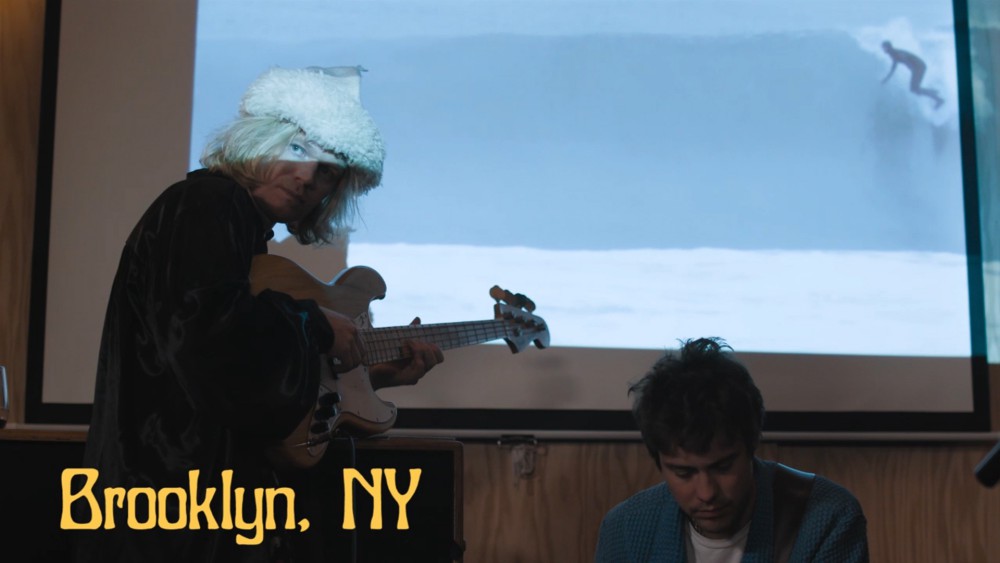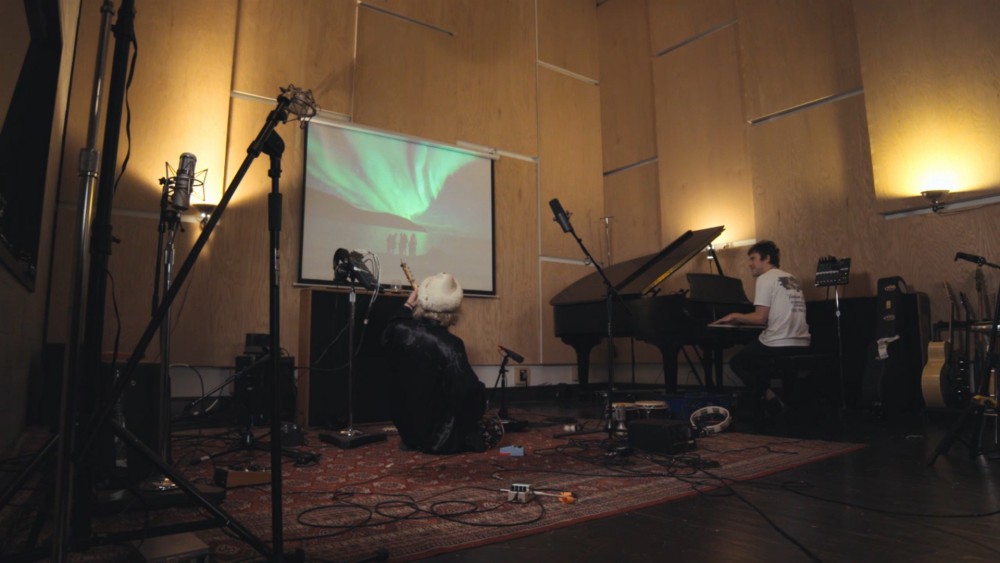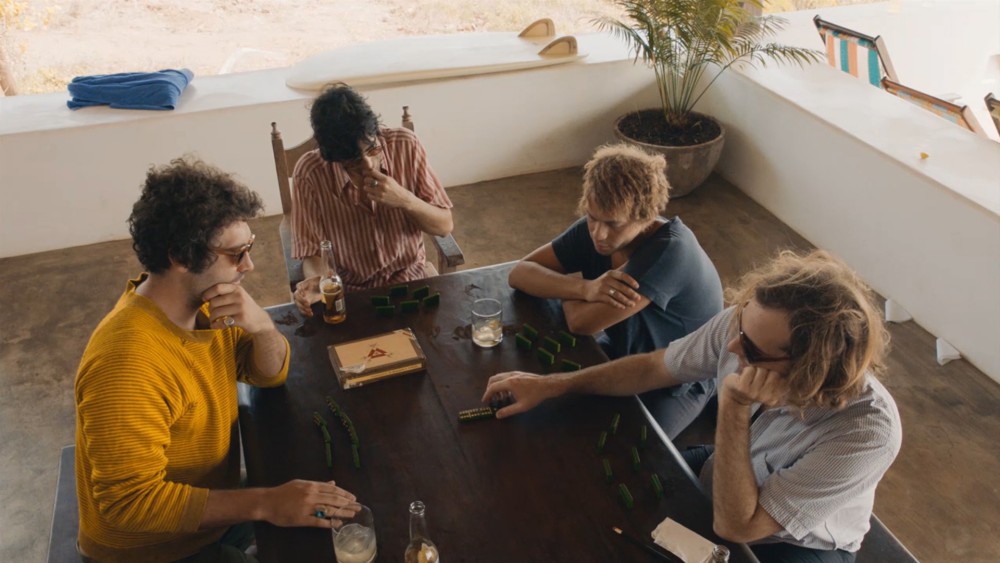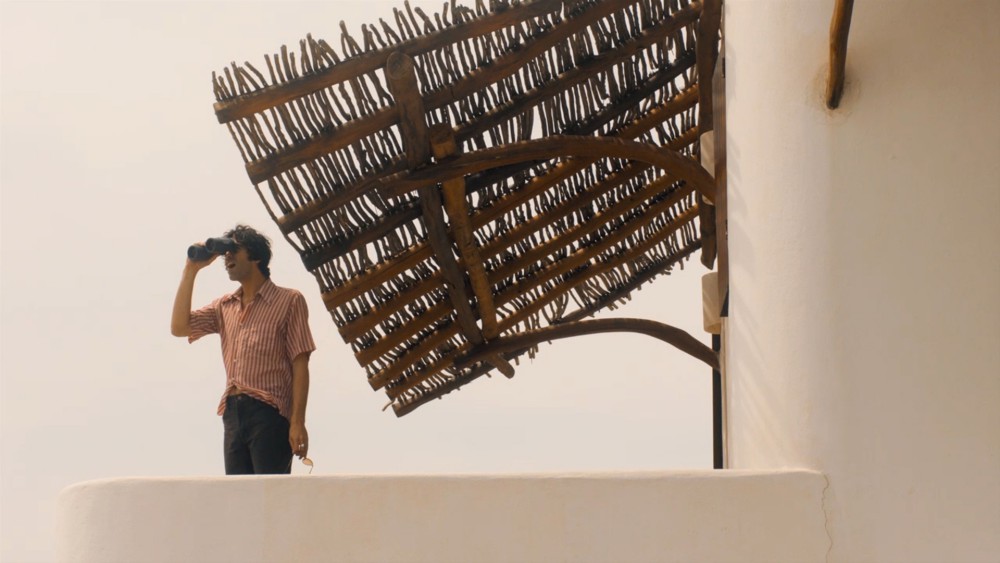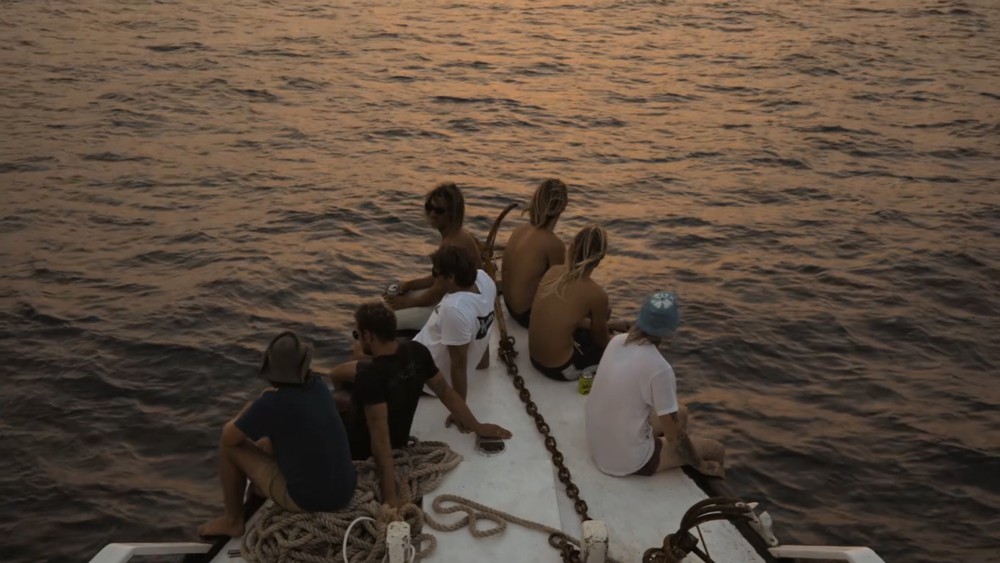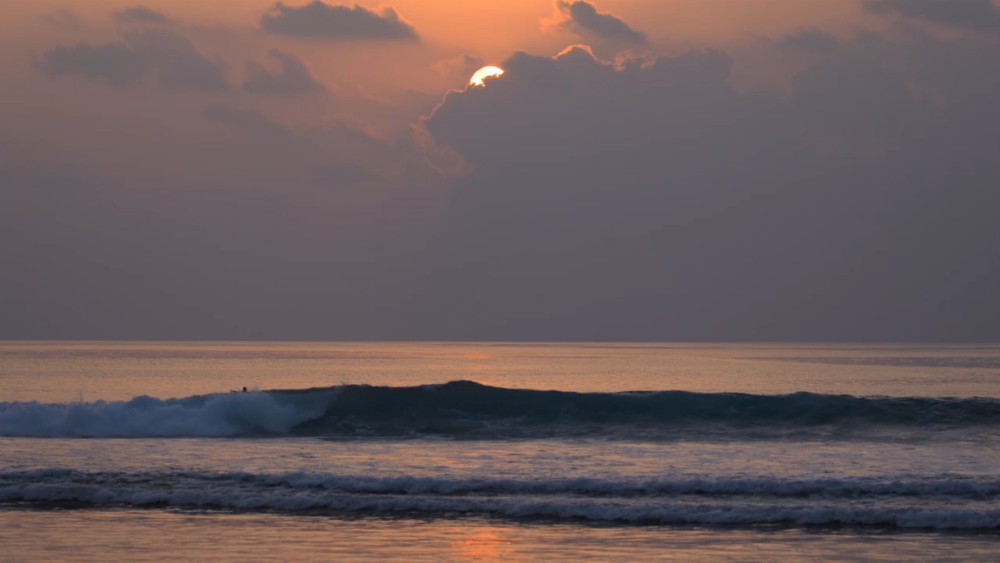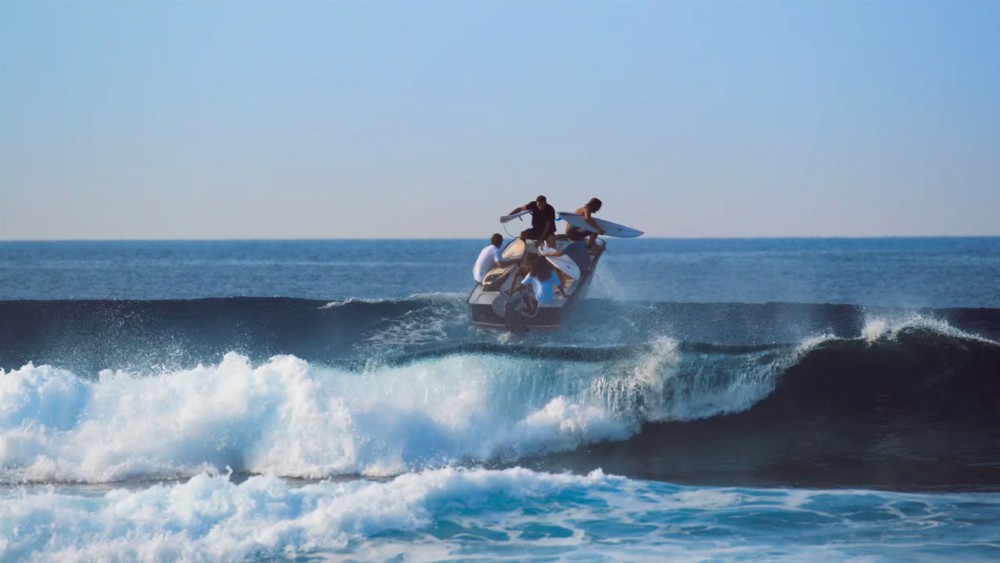Interview by Agathe Pinard
Self Discovery for Social Survival is the surf/music feature film born from the collaboration of Chris Gentile from New York-based surf brand Pilgrim Surf + Supply and Keith Abrahmsson from the record label Mexican Summer. Together they started this ambitious project to connect surf, sound and sight and make a film that would satisfy most senses. World-renowned surfers including Stephanie Gilmore, Ryan Burch, Creed McTaggart and Ellis Ericson joined musicians Allah-Las, Peaking Lights, Connan Mockasin and MGMT ’s Andrew VanWyngarden on this surf journey starting from a secret spot in Mexico, to the southern atolls of the Maldive Islands, and ending in the cold waters of Iceland. The film is narrated by a man who is often referenced as the godfather of American avant-garde, the late Jonas Mekas. I had the chance to talk to the artist, photographer and film director Chris Gentile about the making of his first feature-length film, bringing together artists and surfers, and working with Jonas Mekas.
AGATHE PINARD: I wanted to start by asking about the meaning behind the title, Self Discovery for Social Survival, can you explain it?
CHRIS GENTILE: When we started to conceptualize the film, myself and Keith Abrahamsson from Mexican Summer, we were thinking a lot about music and its relationship to surfing. Surfing is this activity, this pursuit that people engage in and that kind of helps people detach from what they’re do day-to-day, give them some contemplative time to sort of go inward and we were trying to come up with this name, and along the way I came across an old book that was written for climbing, for people who would free climb and climb up mountains. It was basically a book that gave people a pathway to overcome fear. The book was titled Self Discovery for Social Survival. Keith and I both felt like that really resonated with the spirit of what this film was about. Surfers are constantly looking for that open and free space to have a moment in nature, where two forces are meeting each other and the surfers are in the space where the energy that’s coming from nature is dying and being born at the same time. We felt like this title had a lot of metaphoric possibilities and decided to go for it. It’s a mouthful, it’s a big title.
PINARD: This is an ambitious project that mixes surfing, music and animation done by the in house designer of Mexican Summer…
GENTILE: Yes, Bailey Elder but also Robert Beatty, who’s an independent artist and illustrator.
PINARD: How did the idea/project come together ?
It was evolving the whole time we were making the film, it was a very open-ended and experimental process. The one thing that I really wanted to maintain was an open-endedness with everybody involved. So there are multiple points of influence that went into the filmmaking. I didn’t give the surfers any directions while they surfed. We travelled together, we picked these particular places, and they were reacting to the waves that were there for a two-week period of time, and the cinematographers were reacting to the way the surfers were surfing, positioning themselves to get the shot that felt right. I really left a lot of that control up to them. The musicians who were involved were on these trips and they were in the water and surfing the same waves that the professional surfers we travelled with were surfing. They have a first experience and perspective on what was going on. The idea was to let them go back into the studio and have complete creative freedom over the music that they wrote in reaction.
PINARD: What about the animation?
GENTILE: When that came into play, we showed a rough cut to Bailey and Robert. Then Keith Abrahamsson picked a couple of songs that he felt were appropriate to transition from one location like Mexico to the Maldives. To put a song and an animation that would kind of be like a mental palette cleanser, Keith came up with these two fantastic songs. One was an archival song from the seventies, “Void Spirit,” and the other one was a song that was made by Jefre Cantu-Ledesma for the film. Jefre isn’t a surfer, he wasn’t on the trip but he made these beautiful compositions inspired by the idea of being under water, being under the ocean. So, those tracks were given to Bailey and Robert along with the access to this footage, and they reacted and created these animations. Everything was very independent to one another, every aspect of the film. I kind of kept everything on track and helped people when they need my help, but really it was exercise––relinquishing ego and control, and letting everybody’s influence come in and affect the overall project.
PINARD: That’s funny, last week I interviewed Connan Mockasin and we talked about the trip he made to Iceland for the movie, and how he was impressed at the beginning to be around these professional surfers like Stephanie Gilmore who’s a seven-time world champion.
GENTILE: One of the things that I had to do was to think deeply about the personalities that we were going to introduce to one another on these adventures because most of the people didn’t know each other. And taking a surf trip, you don’t know what you’re going to get. There’s no guarantee that the waves are going to be good, or that the weather is going to be good, or a tire may go flat. You may miss opportunities or you may get opportunities that you would never expect. When we went on these trips I had to think about how the group would feel and I was just going off my own instincts and my own guts. The trip to Iceland was really special because it was a group of really different people. They all had a sincere admiration and appreciation for one another. Everyone became fast friends. Iceland was interesting because we were traveling all over that country chasing these storms and these waves. Sometimes getting them and sometimes missing them, but we spent so much time in these vans just traveling across this incredible landscape. Everyone got a lot of time to know each other, more so than on the other trips because on the other trips it was a lot more surfing, people were getting tired, it was different. Iceland was the one where I think the actual chase for the waves was the beauty in that trip, more so than the wave riding.
PINARD: For the movie you took some surfers and went on a trip to Mexico, the Maldives and Iceland, which one was your favorite ?
GENTILE: That’s a great question. I mean, I’ve been to that spot in Mexico so many times and it’s one of my favorite places on the planet. I loved the opportunity to go down there with that group of people, but I have to say the Maldives was really unique and special, because we had this group of Australian surfers together that were kind of like a brotherhood. That trip, we were on a boat, the whole entire time, on an old, old boat. It travels really slowly, had a lot of character and a great captain and a great crew. It was not posh by any means, it was kind of a busted boat. But it was so fun because everybody was just excited to be around each other, find waves, fish. The kind of boredom that you experience on these boats, these guys were wild and doing the most hilarious stuff. Some of it we couldn’t put in the movie it was crazy, drunken backflips off of the boat completely nude at like 3 o’clock in the morning. It was incredible, very memorable.
PINARD: The film is narrated by the late, legendary Jonas Mekas, it might have been the last project he worked on...
GENTILE: I know that Jonas filmed his life every day, so I’m sure that that footage is truly his last work. On this project we were so fortunate to have him agree to come and narrate. The words are Jamie Brisick and Jonas read them. It was so special to get to meet him and experience his humility and his generosity, it was fantastic. If it weren’t for Jonas, I don’t think we could have made a film like this. He’s had so much influence on me as a young artist throughout my life. He gave us, me and the rest of the people at Mexican Summer, everyone, he truly gave us the license to make the film. So, to have him narrate it was an honor, it was so special.
PINARD: How did you get him to work on the project?
GENTILE: Keith Abrahamsson is really responsible for that. Keith presented him with this idea and had already been working with Jonas on a couple of other things, helping him with his archives. They had a working relationship together. Keith asked him if he would be up for narrating the film, and explained to him what it was, and I think it was so strange that he thought it was worth doing. It wasn’t very difficult. He got in a recording studio with him, drank a couple glasses of wine, and I think in one or two takes he nailed the narration. It was great.
PINARD: The movie will premiere in LA this Saturday, are you excited? How do you feel about it ?
GENTILE: I’m a little nervous, I’ve never directed a film before. I’ve made a lot of short films, experimental films, but nothing that’s feature-length, and at this scale, and this level of production. I’m so grateful to have the experience. I’ve learned a lot from it. I’m really excited to see it in front of an audience, see the reaction, see the bands perform live to it, it’s going to be so special.
Self Discovery For Social Survival will premiere in Los Angeles this Saturday June 15 at The Palace Theatre with a live score by Connan Mockasin, Andrew VanWyngarden of MGMT and Allah-Las
The film is out digitally on June 18 and available to pre-order now at https://geni.us/SDSS .


